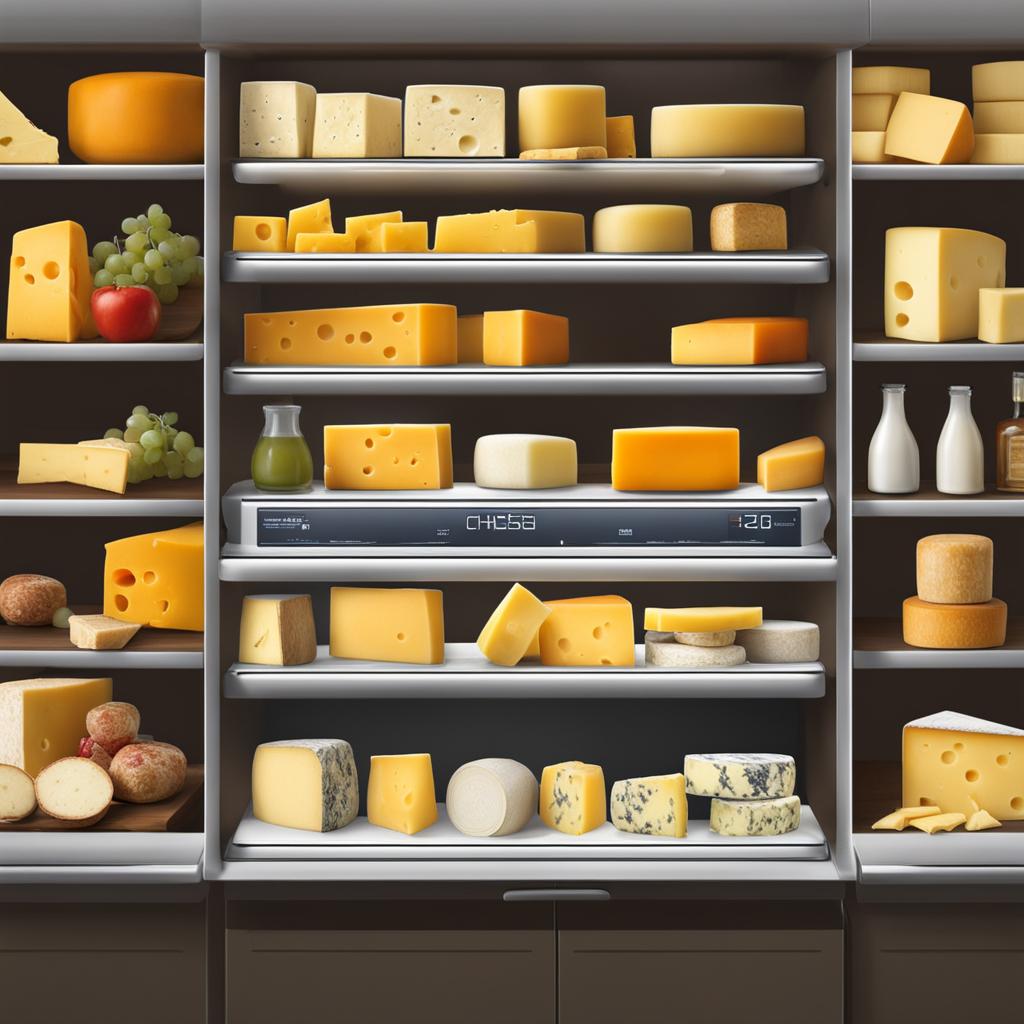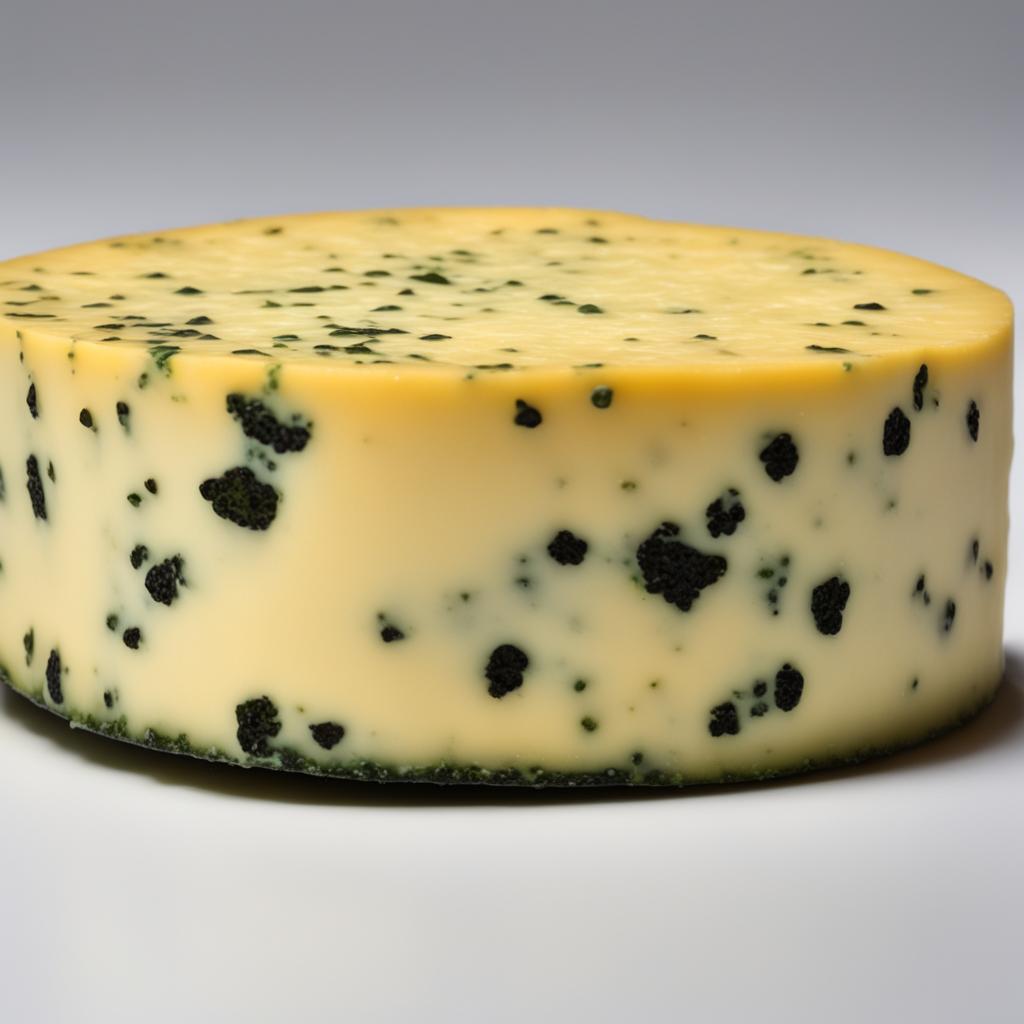Cheese, a beloved staple in many diets, can sometimes be difficult to determine if it has gone bad. This guide aims to help you identify the signs of spoilage in different types of cheese, ensuring you can enjoy your favorite dairy delight with confidence.
Key Takeaways:
- Color, texture, and odor changes are signs of spoilage in cheese.
- Mold growth on cheese is a clear indication of spoilage and should be discarded.
- Specific types of cheese may exhibit unique signs of spoilage.
- Consuming spoiled cheese can lead to food poisoning and potential health risks.
- Proper handling and storage of cheese can help prevent spoilage.
Signs of Spoilage in Cheese: Change in Color, Texture, and Odor
When it comes to determining if cheese has gone bad, there are three key signs to look for: changes in color, texture, and odor. These indicators can help you quickly identify if your cheese is still safe to eat.
First, pay attention to any changes in color. Cheese that has turned brown, gray, or green is likely spoiled and should be discarded. These color changes can occur due to the growth of bacteria or mold, which can negatively affect the quality and safety of the cheese.
Next, consider the texture of the cheese. A soft, mushy, or slimy texture is a clear indication of spoilage. Healthy cheese should have a firm and slightly springy texture. If your cheese feels off or unappetizing to the touch, it’s best to err on the side of caution and throw it away.
Lastly, trust your nose when it comes to determining the freshness of cheese. If the cheese has a strong, foul odor, it is a definite sign that it has gone bad. Your sense of smell can detect the presence of harmful bacteria or mold that may be present in spoiled cheese.
Remember, if you spot any of these signs in your cheese, it’s important to discard it immediately. Consuming spoiled cheese can lead to food poisoning and other health risks. By paying attention to the color, texture, and odor of your cheese, you can ensure that you’re enjoying it at its best while prioritizing your health and safety.
Mold Growth on Cheese: A Clear Sign of Spoilage
When it comes to determining if cheese is bad, one of the most obvious indicators is the presence of mold. Mold growth on cheese is a clear sign that it has spoiled and should be discarded immediately to avoid potential health risks. Visible mold can range in color and texture, such as fuzzy green, white, or blue spots on the surface of the cheese. It’s important to note that mold can also grow underneath the surface, so thoroughly inspect the entire piece of cheese before making a judgment.
Not only does mold make the cheese unappetizing, but it can also produce toxins that are harmful to consume. These toxins can cause food poisoning, leading to symptoms such as nausea, vomiting, diarrhea, and abdominal cramps. In more severe cases, food poisoning from spoiled cheese can even require hospitalization. Therefore, it is crucial to check for any visible mold and promptly dispose of the cheese if mold is present.
Proper storage and handling can help prevent mold growth on cheese. It’s important to store cheese in a cool, dry place to inhibit mold spores from thriving. Additionally, keeping cheese properly wrapped or in airtight containers can help prevent cross-contamination with mold from other foods. Regularly checking the cheese for any signs of spoilage, including mold growth, is essential for ensuring food safety.
| Type of Cheese | Signs of Spoilage |
|---|---|
| Mozzarella | Change in color, slimy texture, or sour smell |
| Goat cheese | Development of mold, off smell, or slimy texture |
| Brie cheese | Pink or black mold, strong ammonia smell, hard or dry texture |
| Cottage cheese | Discoloration, off smell, or sliminess |
| Cream cheese | Mold growth, off smell, or change in color |
| Feta cheese | Sour smell, non-white mold, sliminess |
| Parmesan | Mold (other than white), off smell, discoloration |
| Cheddar cheese | Browning, gray or green color, foul smell, soft or mushy texture |
| Blue cheese | Mold other than blue or blue-green, strong off-putting smell |
| Shredded cheese | Clumping, mold growth, sour smell, color change |
By staying vigilant and paying attention to the signs of spoilage, particularly mold growth, you can ensure that the cheese you consume is fresh and safe. Remember to always discard cheese with visible mold and follow proper storage guidelines to maintain the quality and flavor of your favorite cheeses.
Specific Signs of Spoilage in Different Types of Cheese
When it comes to identifying signs of spoilage in cheese, different types may exhibit specific indicators. Here are some key characteristics to look out for in popular varieties:
1. Mozzarella
Mozzarella can show signs of spoilage through a change in color, a slimy texture, or a sour smell.
2. Goat Cheese
Goat cheese may develop mold, emit an off smell, or become slimy when it spoils.
3. Brie Cheese
Brie cheese can spoil if it has pink or black mold, a strong ammonia smell, or a hard, dry texture.
4. Cottage Cheese
Discoloration, an off smell, or sliminess are common indicators that cottage cheese has spoiled.
5. Cream Cheese
Spoiled cream cheese can develop mold, emit an off smell, or undergo color changes.
6. Feta Cheese
If feta cheese smells sour, has non-white mold, or becomes slimy, it may be spoiled.
7. Parmesan
Indications of spoilage in Parmesan include the presence of mold (other than white), an off smell, or discoloration.
8. Cheddar Cheese
Spoiled cheddar cheese can turn brown, gray, or green, emit a foul smell, and become soft, mushy, or slimy.
9. Blue Cheese
Watch out for mold on blue cheese that appears different from its characteristic blue or blue-green varieties, as well as a strong, off-putting smell.
10. Shredded Cheese
Shredded cheese may clump together, develop mold, emit a sour odor, or change color when it spoils.
| Cheese Type | Signs of Spoilage |
|---|---|
| Mozzarella | Change in color, slimy texture, sour smell |
| Goat Cheese | Mold, off smell, slimy texture |
| Brie Cheese | Pink or black mold, strong ammonia smell, hard, dry texture |
| Cottage Cheese | Discoloration, off smell, sliminess |
| Cream Cheese | Mold, off smell, color changes |
| Feta Cheese | Sour smell, non-white mold, sliminess |
| Parmesan | Mold (other than white), off smell, discoloration |
| Cheddar Cheese | Brown, gray, or green color, foul smell, soft, mushy, or slimy texture |
| Blue Cheese | Mold (other than blue or blue-green), strong, off-putting smell |
| Shredded Cheese | Clumping, mold, sour odor, color change |
By familiarizing yourself with the specific signs of spoilage for different types of cheese, you can confidently assess their freshness and make informed decisions about consumption.
Potential Health Risks of Eating Spoiled Cheese
When it comes to enjoying cheese, it’s crucial to ensure that it’s safe to eat. Consuming spoiled cheese can pose significant health risks, including food poisoning. Food poisoning occurs when you consume contaminated or spoiled food, leading to symptoms such as nausea, vomiting, diarrhea, and abdominal cramps. These symptoms can range from mild discomfort to severe illness and may require hospitalization in some cases. Therefore, it’s essential to be aware of the potential risks and prioritize food safety.
Food poisoning from eating spoiled cheese is a result of harmful bacteria or toxins that develop during the spoilage process. These bacteria, such as Salmonella, Listeria, or E. coli, can cause serious health complications, especially for individuals with weakened immune systems, pregnant women, young children, and the elderly. Furthermore, some types of cheese may contain harmful molds that produce mycotoxins, which can have adverse effects on human health.
To avoid these potential health risks, it’s crucial to check and ensure that the cheese you consume is fresh and free from spoilage. This includes examining the color, texture, and odor, as discussed in previous sections, to determine if any signs of spoilage are present. By being vigilant about the quality of the cheese you consume, you can protect yourself from foodborne illnesses and enjoy cheese safely.
| Food Poisoning Symptoms | Common Bacteria or Toxins Associated |
|---|---|
| Nausea | Salmonella, Listeria, E. coli |
| Vomiting | Salmonella, Listeria, E. coli |
| Diarrhea | Salmonella, Listeria, E. coli |
| Abdominal Cramps | Salmonella, Listeria, E. coli |
Remember, your health and safety should always come first. If you suspect that the cheese you have is spoiled or if you experience any symptoms of food poisoning after consuming cheese, it’s essential to seek medical attention promptly. Additionally, educating yourself about proper cheese handling, storage, and expiration dates can further reduce the risk of consuming spoiled cheese and protect your health.
Proper Handling and Storage of Cheese to Prevent Spoilage
When it comes to enjoying cheese at its best, proper handling and storage are key. By following a few simple guidelines, you can prevent spoilage and ensure the freshness of your favorite dairy delight. Here are some tips to help you keep your cheese in optimal condition:
1. Buy the right amount
It’s important to buy the amount of cheese that you can consume within a week. This ensures that you will finish it before it starts to spoil. If you regularly find yourself throwing away leftover cheese, try buying smaller portions or opting for pre-packaged options.
2. Store at the right temperature
Cheese should be stored in the refrigerator at a temperature between 35°F and 45°F (1.7°C to 7.2°C). This helps slow down the growth of bacteria and preserve the quality of the cheese. Avoid storing cheese in the door of the refrigerator, as the temperature there tends to fluctuate more.
3. Keep it separate
Cheese has a tendency to absorb odors from other strong-smelling foods. To prevent this, store cheese in airtight containers or wrap it tightly in plastic wrap. This not only helps keep the cheese fresh but also prevents it from picking up unwanted flavors.
Following these simple guidelines will help you prolong the shelf life of your cheese and prevent spoilage. By taking the necessary steps to handle and store cheese properly, you can enjoy its deliciousness without worrying about any unpleasant surprises.

How to Safely Discard Spoiled Cheese
When you determine that your cheese has gone bad, it’s important to handle its disposal properly to avoid any potential health risks. Trying to salvage or consume spoiled cheese can make you sick, so it’s best to err on the side of caution and safely discard it. Here are some guidelines for safely disposing of spoiled cheese:
- Do not try to cook or eat the spoiled cheese as it may contain harmful bacteria that can cause food poisoning.
- Place the spoiled cheese in a sealed plastic bag to prevent any potential contamination and odor from spreading.
- Throw the bagged cheese in your regular trash bin or follow your local waste disposal guidelines for food waste.
- If available in your area, consider checking if there are food waste recycling programs that accept spoiled cheese. These programs aim to minimize food waste and divert it from landfills.
Properly discarding spoiled cheese is not only crucial for your health but also plays a part in reducing food waste. By following these steps, you can ensure that your kitchen remains safe and environmentally responsible.
Table: Proper Steps to Discard Spoiled Cheese
| Step | Instructions |
|---|---|
| 1 | Do not attempt to salvage or consume the spoiled cheese. |
| 2 | Place the spoiled cheese in a sealed plastic bag. |
| 3 | Dispose of the bagged cheese in your regular trash bin. |
| 4 | Consider checking if food waste recycling programs in your area accept spoiled cheese. |
By following these proper disposal methods, you can ensure that spoiled cheese does not pose a risk to your health and contribute to a more sustainable approach to food waste management.
Frequently Asked Questions About Spoiled Cheese
As a cheese enthusiast, you may have some burning questions about spoiled cheese. Fear not, I’m here to address your concerns and provide you with the answers you seek. Let’s dive into some frequently asked questions regarding bad cheese, foodborne illnesses, refrigeration, and shelf life.
Question 1: Can eating spoiled cheese make you sick?
Yes, consuming spoiled cheese can put you at risk of foodborne illnesses. When cheese goes bad, it can harbor harmful bacteria such as Listeria, Salmonella, or E. coli, which can lead to nausea, vomiting, diarrhea, and abdominal cramps. In severe cases, food poisoning can require hospitalization. It’s crucial to prioritize food safety and avoid consuming cheese that has gone bad.
Question 2: What happens if cheese is not refrigerated?
Cheese should be properly refrigerated to maintain its freshness and prevent spoilage. When cheese is left unrefrigerated for extended periods, it is exposed to higher temperatures, which can accelerate the growth of bacteria and mold. This can lead to faster spoilage and an increased risk of foodborne illnesses. Always store your cheese in the refrigerator at the recommended temperature to preserve its quality.
Question 3: How long does cheese last in the fridge?
The shelf life of cheese varies depending on the type and how it’s been stored. Generally, hard and aged cheeses like cheddar or Parmesan can last up to six months when properly refrigerated. Soft cheeses like Brie or feta have a shorter shelf life of around one to two weeks. It’s essential to check for signs of spoilage, such as changes in color, texture, or odor, before consuming cheese that has been stored for an extended period.
Remember, when in doubt, it’s best to err on the side of caution and discard cheese that appears to be spoiled. Maintaining proper storage and hygiene practices will help ensure you can savor your favorite cheese varieties safely and without any unpleasant surprises.

| Question | Answer |
|---|---|
| Can eating spoiled cheese make you sick? | Yes, consuming spoiled cheese can lead to foodborne illnesses, causing symptoms such as nausea, vomiting, diarrhea, and abdominal cramps. |
| What happens if cheese is not refrigerated? | When cheese is not refrigerated, it is exposed to higher temperatures, increasing the risk of bacterial growth and accelerated spoilage. |
| How long does cheese last in the fridge? | The shelf life of cheese varies depending on the type, but generally, hard cheeses can last up to six months, while softer cheeses have a shorter shelf life of around one to two weeks. |
Conclusion
After learning about the signs of spoilage in different types of cheese, it is clear that being able to identify these indicators is crucial for ensuring food safety and enjoying cheese at its best. Maintaining the freshness of cheese requires proper handling, storage, and prompt discarding of any spoiled cheese.
By following the guidelines outlined in this comprehensive guide, you can confidently determine if your cheese has gone bad. Remember to pay attention to changes in color, texture, and odor, as well as the presence of mold. These signs serve as important indicators of cheese spoilage.
Ultimately, prioritizing your health and safety when it comes to consuming cheese is of utmost importance. Freshness and food safety go hand in hand, and by understanding the signs of spoilage, you can make informed decisions about the cheese you consume.
Enjoy your cheese with confidence, knowing that you are taking the necessary steps to ensure its quality and freshness. With proper handling, storage, and awareness of spoilage signs, you can savor the deliciousness of cheese without compromising your well-being.
FAQ
How can I tell if cheese is bad?
You can determine if cheese is bad by looking for changes in color, texture, and odor. Cheese that has turned brown, gray, or green is likely spoiled. A soft, mushy, or slimy texture is another indication of spoilage. If the cheese has a strong, foul odor, it is also a sign that it has gone bad.
Is mold on cheese a sign of spoilage?
Yes, mold on cheese is a clear sign that it has spoiled and should be discarded. Mold can produce toxins that can make you sick if consumed. It is important to check for any visible mold and safely dispose of the cheese if mold is present.
What are the specific signs of spoilage in different types of cheese?
Different types of cheese may exhibit specific signs of spoilage. Here are a few examples:
– Mozzarella: Change in color, slimy texture, or sour smell.
– Goat cheese: Mold, off smell, or slimy texture.
– Brie cheese: Pink or black mold, strong ammonia smell, or hard, dry texture.
– Cottage cheese: Discoloration, off smell, or sliminess.
– Cream cheese: Mold, off smell, or change in color.
– Feta cheese: Sour smell, non-white mold, or sliminess.
– Parmesan: Mold (other than white), off smell, or discoloration.
– Cheddar cheese: Brown, gray, or green color, foul smell, or soft, mushy, or slimy texture.
– Blue cheese: Mold other than blue or blue-green, or strong, off-putting smell.
– Shredded cheese: Clumping, mold, sour smell, or change in color.
Can eating spoiled cheese make you sick?
Yes, consuming spoiled cheese can lead to food poisoning. Symptoms can include nausea, vomiting, diarrhea, and abdominal cramps. In severe cases, food poisoning can require hospitalization or be life-threatening. It is important to ensure cheese is safe to eat to avoid foodborne illnesses.
How should I handle and store cheese to prevent spoilage?
To prevent cheese from going bad, it is essential to handle and store it properly. This includes buying the correct amount of cheese that can be consumed within a week, storing cheese at the appropriate temperature, and keeping it away from other strong-smelling foods. Following proper storage guidelines will help extend the shelf life of cheese and prevent spoilage.
What should I do if I determine that the cheese is spoiled?
If you determine that the cheese is spoiled, it is important to discard it immediately. Do not try to salvage it by cooking or eating it. It can make you sick, so it is best to err on the side of caution and throw it away. Some cities may have food waste recycling programs that accept spoiled cheese, so it is worth checking if this is an option in your area.
What are some frequently asked questions about spoiled cheese?
Some common questions about spoiled cheese include whether it can make you sick, if cheese can go bad if not refrigerated, and how long cheese lasts in the fridge. Answers to these questions help to clarify the potential risks of consuming spoiled cheese and the importance of proper storage to maintain its freshness.
Source Links
- https://homecookbasics.com/how-to-tell-if-cheese-is-bad/
- https://www.aarp.org/home-family/your-home/info-2022/proper-cheese-storage.html
- https://thecheesewanker.com/science/cheese-gone-bad/
Related Recipes:
 Spotting Spoiled Blue Cheese: How to Tell If Blue Cheese is Bad
Spotting Spoiled Blue Cheese: How to Tell If Blue Cheese is Bad
 Spotting Bad Lemons: What to Look For
Spotting Bad Lemons: What to Look For
 How to Tell if Cauliflower is Past Its Prime
How to Tell if Cauliflower is Past Its Prime
 How to Identify Spoiled Canned Foods
How to Identify Spoiled Canned Foods
 Identifying a Bad Whole Turkey
Identifying a Bad Whole Turkey
 Signs Your Almond Milk Has Spoiled
Signs Your Almond Milk Has Spoiled
 How to Tell if Cottage Cheese is Bad: Warning Signs
How to Tell if Cottage Cheese is Bad: Warning Signs
 How Long Can Yogurt Sit Out? Guidelines and Safety
How Long Can Yogurt Sit Out? Guidelines and Safety








